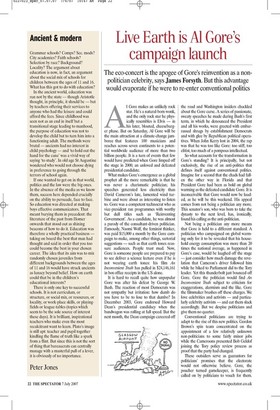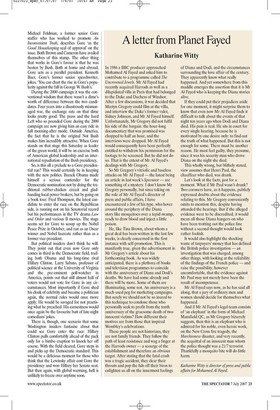Live Earth is Al Gore's campaign launch
The eco-concert is the apogee of Gore's reinvention as a nonpolitician celebrity, says James Forsyth. But this advantage would evaporate if he were to re-enter conventional politics Al Gore makes an unlikely rock star. He's a natural-born wonk, and the only rock star he physically resembles is Elvis — in his later, bloated, cheeseburger phase. But on Saturday, Al Gore will be the main attraction at a climate-change jamboree that features 100 musicians and reaches across seven continents to a potential worldwide audience of more than two billion people. It is a turn of events that few would have predicted when Gore limped off the stage in 2000, an unloved and defeated presidential candidate.
What makes Gore's emergence as a global prophet all the more remarkable is that he was never a charismatic politician; his speeches generated less electricity than David Cameron's late, lamented wind turbine and were about as interesting to listen to. Gore was a competent technocrat who as vice-president ran programmes with worthy but dull titles such as 'Reinventing Government'. As a candidate, he was almost a parody of the consultant-driven politician. Famously, Naomi Wolf, the feminist thinker, was paid $15,000 a month by the Gore campaign to make, among other things, sartorial suggestions — such as that earth tones reassure audiences. People trust mud. Now, Gore is someone people are prepared to pay to see deliver a science lecture even if he is not wearing earth tones: his film An Inconvenient Truth has pulled in $24,146,161 in box office receipts in the US alone.
It is hard to recall quite how unpopular Gore was after his defeat by George W Bush. The reaction of most Democrats was not sympathy but irritation: how dumb do you have to be to lose to that dumbo? In December 2003, Gore endorsed Howard Dean's presidential candidacy when the bandwagon was rolling at full speed. But the next month, the Dean campaign careered off the road and Washington insiders chuckled about the Gore curse. A series of passionate, sweaty speeches he made during Bush's first term, in which he denounced the President and all his works, were greeted with embarrassed shrugs by establishment Democrats and with glee by Republican political operatives. When John Kerry lost in 2004, the rap was that he was too like Gore: too stiff, too elitist, too much of a pompous intellectual.
So what accounts for the transformation in Gore's standing? It is principally, but not exclusively, the rise of an anti-politics that defines itself against conventional politics. Imagine for a second that the chads had fallen the other way in Florida and that President Gore had been as bold on global warming as the defeated candidate Gore. It is inconceivable that Gore would now be lauded, as he will be this weekend. His appeal comes from not being a politician any more. This senator's son, who was born to take the dynasty to the next level, has, ironically, found his calling as the anti-politician.
Not being a politician any more means that Gore is held to a different standard. A politician who campaigned on global warming only for it to be revealed that his household energy consumption was more than 20 times the national average, as happened in Gore's case, would be laughed off the stage — just consider how much damage the revelation that Cameron's driver followed him while he biked to Parliament did to the Tory leader. Yet this thunderbolt just bounced off Gore. Gore the politician would find An Inconvenient Truth subject to criticism for exaggerations, alarmism and the like. Gore the filmmaker brushes off these charges. We love celebrities and activists — and particularly celebrity activists — and cut them slack accordingly. But we despise politicians and give them no quarter.
Conventional politicians are trying to adapt to the rise of this new politics. Gordon Brown's spin team concentrated on the appointment of a few relatively unknown non-politicians to some fairly minor jobs while the Cameroons presented Bob Geldof joining the Tory policy review process as proof that the party had changed.
These outsiders serve as guarantors for politicians' promises that the electorate would not otherwise believe. Gore, the poacher turned gamekeeper, is frequently called on by politicians to vouch for them.
Michael Feldman, a former senior Gore staffer who has worked to promote An Inconvenient Truth, describes Gore 'as the Good Housekeeping seal of approval' on the issue. Both Brown and Cameron have availed themselves of this stamp. The other thing that works in Gore's favour is that he was beaten by Bush. Both at home and abroad, Gore acts as a parallel president. Kenneth Baer, Gore's former senior speechwriter, jokes, 'You can chart the rise in Gore's popularity against the fall in George W. Bush's.'
During the 2000 campaign it was the conventional wisdom that there wasn't a dime's worth of difference between the two candidates. Four years into a disastrously mismanaged war, the exchange rate on that dime looks pretty good. The press and the hard Left who so pounded Gore during the 2000 campaign are now giving him an easy ride in full morning-after mode. Outside America, the fact that he is the original Not Bush makes him incredibly attractive. When Gore stands on that stage this Saturday as leader of the green world, it will be an exercise both of American global leadership and an international repudiation of the Bush presidency.
So, is this all a prelude to a Gore presidential run? This would certainly be in keeping with the new politics. Barack Obama made himself a serious contender for the Democratic nomination not by doing the traditional rubber-chicken circuit and gladhanding local power brokers, but by going on a book tour. Fred Thompson, the latest candidate to enter the race on the Republican side, is running not on his Senatorial record but his performances in the TV drama Law and Order and various B movies. The stage seems set for Gore to scoop up the Nobel Peace Prize in October, and run as an Oscar winner and Nobel laureate rather than as a former vice-president.
But political insiders don't think he will. They point out that even now Gore only comes in third in the Democratic field, trailing both Obama and his long-time rival Hillary Clinton. Larry Sabato, professor of political science at the University of Virginia and the pre-eminent poll-watcher in America, points out that still almost half of voters would not vote for Gore in any circumstances. Most importantly if Gore shed his cloak of celebrity and became a politician again, the normal rules would once more apply. He would be savaged for not practising what he preached. His earnestness would once again be the favourite butt of late-night comedians' jokes.
There is, though, one scenario that some Washington insiders fantasise about that could see Gore enter the race: Hillary Clinton pulls comfortably ahead of the pack only for a bimbo eruption to knock her off course. With the field cleared, Gore steps in and picks up the Democratic standard. This would be a delicious moment for those who think that the Lewinsky affair cost Gore the presidency and won Hillary her Senate seat. But then again, with global warming, hell is unlikely to freeze over anytime soon.




















































 Previous page
Previous page